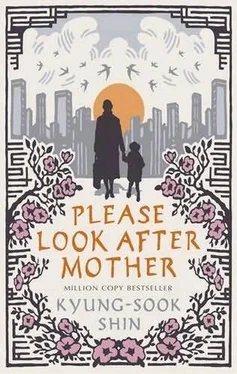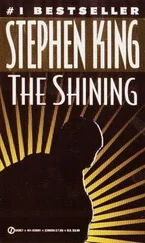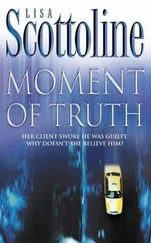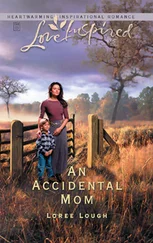This was before their things had arrived from America, and she wasn’t used to the new house yet, and the newborn was still breastfeeding, so there wasn’t time to go to the market. Her mother-in-law sent a chest of baby croakers, salted and gently dried, and they ate the whole thing in ten days. Your sister laughed and said, “I would make bean-sprout soup and broil a couple of fish, then make zucchini soup and fish.” When she asked her mother-in-law where she could get more, she found out that she could order them online. Because they had eaten through the first batch so quickly, she ordered two.
“When the croakers came, I washed them and counted; there were two hundred. I was washing the fish so that I could wrap four or five of them in plastic and put them in the freezer, to make them easier to cook, and all of a sudden I wanted to fling them all on the floor,” your sister said calmly. “And I thought of Mom. I wondered, How did Mom feel all those years in that old-fashioned kitchen, cooking for our big family? Remember how much we ate? We had two small tables filled with food. Remember how big our rice pot was? And she had to pack all of our lunches, including the side dishes she made with whatever she could get in the countryside… How did Mom get through it every day? Since Father was the eldest, there was always a relative or two staying with us. I don’t think Mom could have liked being in the kitchen at all.”
You were caught off guard. You had never thought of Mom as separate from the kitchen. Mom was the kitchen and the kitchen was Mom. You never wondered, Did Mom like being in the kitchen?

To earn money, your mom bred silkworms and brewed malt and helped make tofu. The best way to make money was not to use it. Mom saved everything. Sometimes she would sell a ratty lamp, a worn ironing stone, or an old jar to people from out of town. They wanted the antiques that Mom was using, and even though she wasn’t attached to any of those things, she haggled with people over the price as if she had become a vendor. At first it would seem your mom was losing, but then she would get her way. After listening to them quietly, she’d say, “Then just give me this amount,” and they would scoff, “Who would buy that useless thing for so much?” Mom would retort, “Then why do you go around buying this stuff?” and take the lamp back. They would grumble, “You’d make a good merchant,” and give Mom what she asked for.
Your mom never paid full price for anything. Most things she did herself, so her hands were always busy. She sewed and knitted, and she tilled the fields without rest. Mom’s fields were never empty. In the spring she planted potato seeds in furrows and planted lettuce and crown daisies and mallow and garlic chives and peppers and corn. Under the fence around the house she dug holes for zucchini, and in the field she planted beans. Mom was always growing sesame and mulberry leaves and cucumbers. She was either in the kitchen or in the fields or in the paddies. She plucked potatoes and yams and zucchini, and pulled cabbages and radishes from the ground. Mom’s labor showed that nothing would be reaped if the seeds were not sown. She paid only for things that could not be grown from seeds: ducklings or chicks that ran around in the yard in the spring, piglets that lived in the sty.
One year the dog gave birth to nine puppies. After a month passed, Mom left two behind and put six in a basket and, because the basket was full, put the last one in your arms. “Follow me,” she said. The bus you and Mom rode was crowded with people who were going into town to sell things: sacks of dried pepper and sesame and black beans; baskets weighed down with just a few cabbages and radishes. Everyone huddled in a row at the township bus stop, and passersby stopped to strike a deal. You slipped the warm puppy you were holding into the basket with the other squirming puppies, squatted next to Mom, and waited for them to be sold. The puppies, which Mom had taken care of for a month, were plump and healthy, gentle, without any suspicion or hostility toward people. They wagged their tails at the people who gathered around the basket and licked their hands. Mom’s puppies sold faster than the radishes or the cabbages or the beans. When she sold the last one, she stood up and asked, “What do you want?” You held on to her hand and stared at her, your mom, who had rarely asked you such a thing.
“I said, what do you want?”
“A book!”
“A book?”
“Yeah, a book!”
Mom acted as if she didn’t know what to do. She looked down at you for a minute and asked where they sold books. You took the lead and guided Mom to the bookstore at the entrance of the market, where five roads met. Mom didn’t go in. “Pick out just one,” she said, “and ask how much it is and come tell me.” Even when she bought rubber shoes, she made you try on each one, and always ended up paying less than what the shopkeeper wanted; but for a book she told you to pick one, as if she wasn’t going to haggle over the price. The bookstore suddenly felt like a prairie to you. You had no idea which book to choose. The reason you wanted a book was that you would read books your brothers brought home from school, but they always took the books away from you before you read them to the end. The school library had different books from the ones that Hyong-chol brought home. Books like Mrs. Sa Goes to the South or Biography of Shin Yun-bok . The book you chose, while Mom stood outside the bookstore, was Human, All Too Human . Mom, about to pay for a book that wasn’t a textbook for the first time in her life, looked down at the book you’d picked out.
“Is this a book you need?”
You nodded quickly, worried that she would change her mind. Actually, you didn’t know what this book was. It said that it was written by Nietzsche, but you didn’t know who that was. You’d just picked it because you liked the way the title sounded. Mom gave you the money for the book, the full price. On the bus, clasping the book against your chest instead of the puppy, you gazed out the window. You saw an old, stooped woman looking at passersby desperately, trying to sell the bowlful of sticky rice that remained in her rubber bin.

On the mountain path where you could see your grandparents’ old village, your mom told you that her father, who drifted from town to town, digging for gold and coal, came home when she was three years old. He went to work at a construction site for a new train station and got in an accident. Villagers who came to tell Grandmother about the accident looked at Mom, running and playing in the yard, and said, “You’re laughing even though your father has died, you silly child.”
“You remember that from when you were three?”
“I do.”
Your mom said she was sometimes resentful of her mom, your grandmother. “I’m sure she had to do everything herself as a widow, but she should have sent me to school. My brother went to a Japanese-run school, and my sister did, too, so why did she keep me at home? I lived in darkness, with no light, my entire life…”
Your mom finally agreed to come to Seoul with you if you promised not to tell Hyong-chol. Even when she left the house with you, she kept asking you to promise this.
As you went from hospital to hospital to find the source of Mom’s headaches, a doctor told you something surprising: your mom had had a stroke a long time ago. A stroke? You said that had never happened. The doctor pointed at a spot on her brain scan and said it was evidence of a stroke. “How could she have had a stroke without even knowing about it?” The doctor said your mom would have known. Given how the blood was pooled there, she would have felt the shock. The doctor said Mom was in constant pain. That Mom’s body was in constant pain.
Читать дальше













